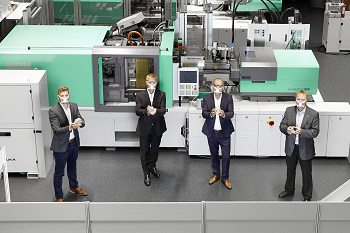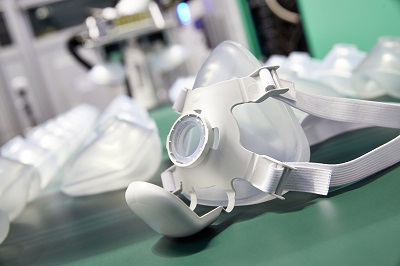After Arburg started producing protective glasses on Allrounder injection molding machines at its Lossburg, Germany headquarters last April, the company has now added a new project to combat the spread of the coronavirus. Beginning 11 May, Arburg has started production of face masks injection molded from LSR (liquid silicone rubber) and PP (polypropylene). About 3,500 of these multifunctional high-tech masks are expected to be produced daily under series production conditions. The product will initially be used to protect the company's own employees worldwide and will then be distributed as quickly as possible via the district of Freudenstadt to hospitals and care facilities.
"We are involved in various aid initiatives and are also push internal company projects such as this face mask. The demand is enormous. We are receiving specific requests from hospitals and nursing homes from all over the region," says Gerhard Böhm, Arburg Managing Director Sales, regarding the current situation.
Arburg developed the high-quality and sustainable masks made of flexible LSR and PP and additively manufactured the first prototypes with its Freeformers. The LSR component and mold simulation was carried out using the Sigmasoft software from Sigma Engineering. In a record time of only around five weeks, the two Arburg partners Polar-Form and Foboha built the corresponding injection molds for the LSR and PP components. The companies Ewikon (cold runner) and Männer (hot runner) were also involved in the implementation of the mold technology. Other partners were Barth Mechanik (gripper) and Packmat (packaging technology), the raw material for several 10,000 masks was sponsored by the chemical group Wacker and Borealis.

Multifunctional face mask
The flexible masks do much more than act as a simple fabric mouthguard: The multifunctional product consists of a soft LSR mask that is put over the nose and mouth and a firm PP shield with eyelets for attaching elastic bands. In the middle there is a standardised connection with a hole (DIN EN ISO 5356-1:2004).
The opening is sealed with a flow gate to protect against infection in everyday life, e.g. for professional meetings or shopping at the supermarket. This diverts the breathing air downwards and thus significantly reduces the risk of infection.
In the next expansion stage, a filter housing can be fitted on the opening. Arburg intends to manufacture this component in cooperation with partners very soon. The companies involved in this project are Weber (mould), Günther (hot runner technology), Küfner (filter), Herrmann Ultraschall (welding technology) and Packmat (packaging technology).
By using corresponding FFP2 or FFP3 filters, doctors and nurses, for example, can reliably protect themselves from viruses or bacteria when in direct contact with sick people.
The masks are designed for multiple use and can be easily sterilised. "It was also important for us to take advantage of the performance of plastic materials and to create a product that is suitable for long-term use. In this way, resources can be conserved," emphasizes Dr. Thomas Walther, Head of the Application Technology Department at Arburg. The temper-free LSR material of type Elastosil LR 5040 is suitable for food contact applications according to FDA CFR 21 §177.2600 and BfR XV. "Silicones", and has been tested for biocompatibility. In addition, the LSR has good sealing properties, a high tear resistance and can be easily sterilized.

The project expects to produce at least 15,000 masks per week in two-shift operation but if operation would be round the clock, it would even be possible to double this number. Two electric injection molding machines are being used for this purpose. An Allrounder 570 A with a clamping force of 2,000 kN produces the LSR masks at the Arburg Training Center using a 4-cavity mould from Polar-Form, while an Allrounder 470 E Golden Electric with a clamping force of 1,000 kN and a 2-cavity mould from Foboha simultaneously produces the associated PP shields at the Customer Center. The larger injection molding machine operates with a LSR dosing system from Elmet and a six-axis robot from Kuka, which, in a sophisticated demolding process, removes the flexible masks from the mould and places them on a conveyor belt. In the second machine, the PP shields are handled more easily by a linear Multilift Select robotic system. Finally, the PP shield is manually placed on the silicone mask with interlocking, this is completed with the corresponding elastic bands and packed. By using a temper-free LSR, this step can be carried out without disruptive production stops caused by the time-consuming and energy-intensive tempering of the component.
The first contingents of face masks are being distributed to the company's own employees worldwide and to partners who have been significantly involved. In the next step, the district of Freudenstadt will take over the additional coordination and distribution to hospitals, care facilities and civil defence organizations.














